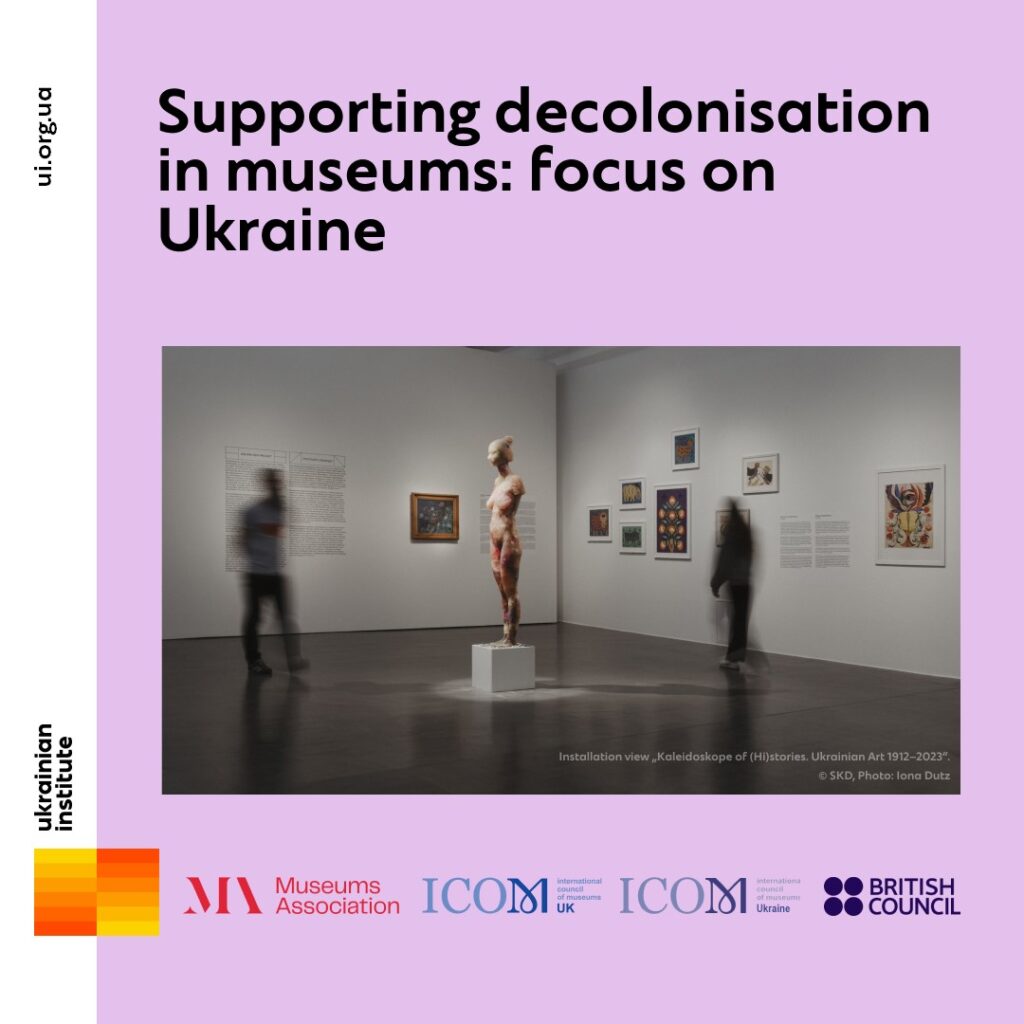Enjoy this article?
Most Museums Journal content is only available to members. Join the MA to get full access to the latest thinking and trends from across the sector, case studies and best practice advice.

Work has started on a new decolonisation guide for museums focused on Ukraine, which will be published later this year.
The guide will act as a tool for specialists and non-specialists allowing them to more accurately identify and describe cultural heritage from Ukraine. It will also help promote wider understanding of historical efforts by imperial powers to subjugate Ukrainian history and heritage.
Developed and tested in collaboration with a range of international partners and subject experts, the guidance will include case studies and examples of how curators can be more effective in cataloguing, labelling, and contextualising Ukrainian history and heritage.
The guidance is being produced by an international partnership project led by the Ukrainian Institute in collaboration with the Museums Association (MA), the United Kingdom and Ukraine National Committees of the International Council of Museums (ICOM UK and ICOM Ukraine), and supported by the British Council.
The guidance will offer practical solutions to the following key questions:
The new guide builds on the work of the MA's publication, Supporting Decolonisation in Museums (2021), which developed extensive resources to address questions of how British imperial and colonial history is represented in museums.
The project aims to extend that work, exploring how to approach similar themes and problems in the context of Ukraine and wider Europe. The guide will evolve from a series of workshops, focus groups and independent testing and will be published in digital format.
It will be completed by summer 2024 and available to download free of charge.
The MA’s Supporting Decolonisation in Museums guide has also been translated into Ukrainian by the Ukrainian Institute.
“Ukrainian heritage has often been overlooked, misinterpreted, or misrepresented in museums around the globe," said Tetyana Filevska, creative director of the Ukrainian Institute.
"We hope to be able to bring Ukrainian heritage out of the shadows and into the light. We want to bring Ukraine’s complex history to life and to restore and protect Ukrainian heritage and history.”
The MA’s director, Sharol Heal, said: “We are pleased to be working with the Ukrainian Institute, ICOM UK, ICOM Ukraine and the British Council to develop this guidance. Decolonisation is an evolving area of museum practice and needs to be tailored to the specific circumstances of each nation. I hope our principles and guidance can be a useful starting point for this work.”
Christian Baars, co-chair of ICOM UK, said: “We are delighted to continue our collaboration with partners in Ukraine, alongside the Museums Association and British Council. The new guide will build upon a number of initiatives undertaken by ICOM UK to support the protection of Ukraine’s cultural heritage. These include ‘Heritage in Crisis’, a series of online talks about the protection of Ukrainian cultural heritage and helping to coordinate a UK shipment of conservation and digitising equipment at the start of the full-scale invasion.
“We also oversaw an ICOM Special Grants project to support the digitisation of archival materials at the National Preserve 'Kyiv-Pechersk Lavra', in partnership with ICOM Ukraine and the University of the West of England. Decolonisation is one of ICOM’s strategic focus areas and, as a national committee, ICOM UK is pleased to play a part in finding practical solutions to the legacy of colonialism.”
Claire de Braekeleer, director of arts, wider Europe, at the British Council, said: “This project builds on our recent experience with the UK/Ukraine Season of Culture and the increased interest in collaboration between our two countries. The topic of decolonisation is a critical one for the arts community in Ukraine and the wider region. This guide will provide a practical tool for the UK museums sector to engage meaningfully with Ukraine; past, present and future.”
Anastasiia Cherednychenko, historian and chair of ICOM Ukraine, said: “Colonialism leaves a profound and deep impact on culture, language, and thinking. As a result, exploring and unpacking these consequences can be a painful, time-consuming and complex process.
“Our task as Ukrainian citizens is to take a leading role in restoring and securing the history and heritage of our nation.
"As part of this decolonisation process, it is critical to involve the perspectives of experienced experts, the participation of British museum professionals, who have experience in developing decolonisation guides with a British imperial focus, is critical.”
Most Museums Journal content is only available to members. Join the MA to get full access to the latest thinking and trends from across the sector, case studies and best practice advice.